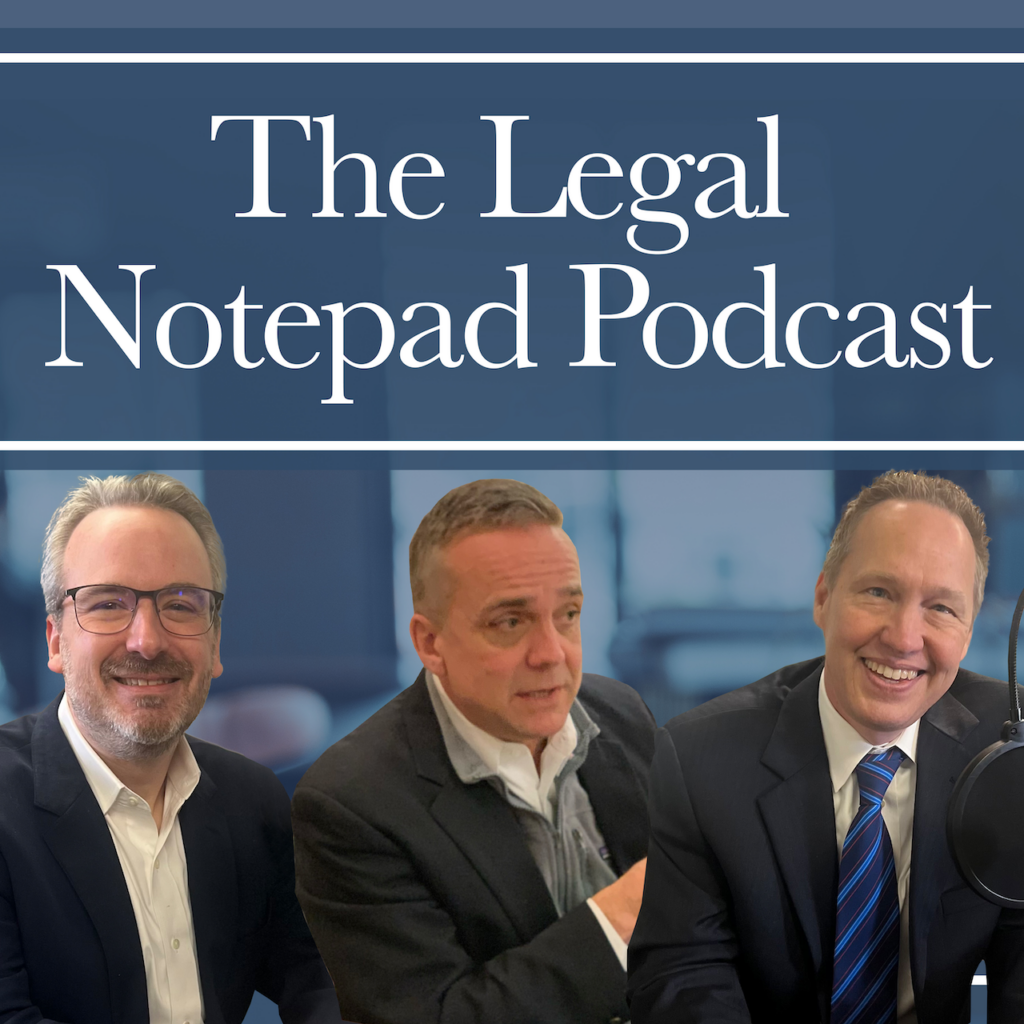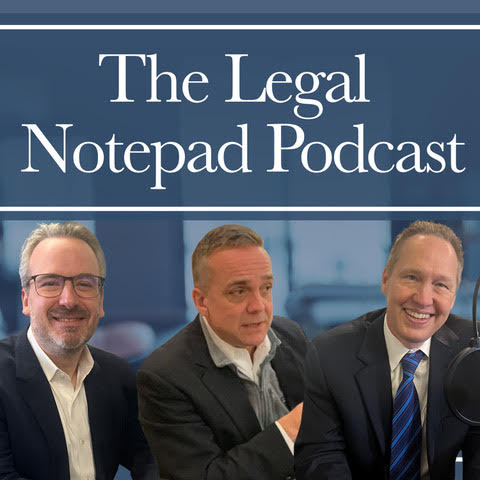Episode 12: Louisville attorneys Rob Mattingly and Kevin C. Burke explore parental liability, now that 15 year olds are able to get a drivers license. Parents should be aware of their responsibilities related to this new issue. Rob and Kevin are joined by Lauren Byrn and for the first time, attorney Adam Redden.
Editor’s Note: If you are an attorney and would like CLE credit for this episode, visit the Kentucky Justice Association website, click the Education and Training tab and look for the podcast.
TODAY’S LEGAL QUESTION:
Lauren asks, “Now that Kentucky has a new law allowing 15 year olds to get their drivers licenses, what are the liability for parents?”
The Statute for Parental Liability for Minors Driving an Automobile
KRS186.590 is the relevant law for this issue. This law has been in place for decades. Rob addresses non-lawyers by explaining how a parent can be held liable for a collision caused by your minor child. There are 2 broad scenarios outlined by this statute.
The first scenario (Section 1) assumes you signed the application allowing the minor to get his/her license. Therefore, you are deemed responsible for anything the minor does in the car, because you signed the application. However, there is an exception. If you’ve made sure the vehicle they are driving has insurance, you are not liable.
The second scenario (Section 2) is much broader. Regardless of whether you personally signed the application, and regardless of the insurance, if you own the vehicle or allow the minor to drive the vehicle, you are liable. Under Section 3, Rob notes the person who owns or furnishes the vehicle may not have been the one who signed the application for the minor to get his/her license.
By the way, if you were to allow a minor who is not your child, to drive your vehicle, you are liable for what may happen.
Kevin explains the two scenarios are there to ensure there is a source of recovery for someone who might be involved in a collision with a negligent, minor driver.
To illustrate how all of this works, Lauren will pose a few questions and Adam will provide the answers.
Example #1: Mom takes her 16 year old to get his/her licenses. She signs the application. However, she does not get insurance on the vehicle. Is she liable?
Yes, under Part 1 of the statue, the mother would be liable because she signed the application. Kentucky requires vehicles to be insured. The fact that the vehicle wasn’t insured at the time of the accident isn’t the primary issue. However, she should have made sure the vehicle was insured. Insured or not, the mother would be held liable.
Example #2: Mom signs the application and gets the car insured. However, dad has a different vehicle. He gives the child permission to drive his car. If the minor driver causes an accident, who is liable?
Adam explains that the mother would not be held liable. Although she signed and insured the first vehicle, the statue specifically notes that if you furnish a vehicle to a minor, that person is liable. Therefore, the dad would be held liable for the minor’s negligence. In reality, assuming the car is family asset, dad would still be liable.
The above example would be relevant if the parents were divorced.
Example #3: An adult, who is not the parent and didn’t sign the application, agrees to let a minor borrow a car. Would the adult be held liable?
In this example, according to Section 3, the adult is liable because he/she furnished the vehicle to a minor driver. The adult assumed the liability.
Example #4: Mom signs the application and gets insurance on the car. Unfortunately, dad allows the policy to lapse. Who would be liable?
Mom would be liable, however dad could potentially also be held liable if he had control of the vehicle and allows the minor to drive it, Section 3 would apply.
Example #5: Assume adult #1 borrows a car from adult #2 (with permission). Then, adult #1 allows a minor to drive the car. The minor causes an accident. Who is liable?
Kevin explains that this is a Section 3 issue. Anyone who causes or knowingly permits a minor to drive a vehicle assumes liability. It could also be said that adult #1 furnished the vehicle.
Adam clarifies that adult #2 could also be liable. He/she permitted adult #1 to use the car, even though it was adult #1 who permitted the minor to drive it. Rob suggests that adult #2 should have explicitly told adult #1 that the minor was not allowed to drive the car. At the end of the day, this isn’t a situation you want to find yourself in, so be advised.
Practical Pointers You Can Take to Protect Yourself
If you are the parent, make sure you keep insurance on the car your minor is driving. You should also decide how much insurance you can buy. While insurance premiums are expensive, you need to consider the value of the assets you need to protect (i.e. your home, your checking and savings accounts, etc.).
Are You Protected if the Car is in the Child’s Name?
Kevin explains that this really depends upon the facts. Assuming the car is titled in the child’s name and there is insurance, it’s possible the parents could escape liability, but it’s not an automatic guarantee. Kevin advises parents to simply assume they will be held liable. Because Section 3 mentions anyone who gives or furnishes the vehicle to the minor, there will be questions about how the minor go the vehicle. Did the parents help? There are many considerations, so don’t assume you won’t be held liable.
Applicable Case Law in Kentucky
Again, we’re talking about KRS186.590. It consists of 3 sections. Section 1 states, the minor’s negligence “shall be imputed to the person who signed the application. That person shall be jointly and severally liable with the minor for any damages caused by the negligence.”
Section 2 can relieve you of the liability. It refers to keeping insurance on the vehicle in an effort to remove the liability from the individual, such as the parent.
Section 3 is very broad. This states that if you own the vehicle and allow or knowingly permit the minor to drive it, you’re responsible. It goes on the say “and, any person who gives or furnished a motor vehicle to a minor shall be jointly and severally liable.”
Bottoms v. Smith (KY Court of Appeals, 2022)
A grandfather is watching over his visiting 15 year old grandson. While the grandfather is napping, the minor (who doesn’t have a license) borrows the grandfather’s truck. The minor hits a pedestrian. The pedestrian sues the grandfather.
This is a Sub-Section 3 issue. The grandfather owned the truck. The defendant motioned for summary judgement, because he was napping when the minor took the vehicle, without permission. The Nelson circuit court granted the motion, noting that permission was not given to the minor.
The court of appeals affirmed the decision emphasizing the statue states “anyone who knowingly permits…” This did not apply to the situation, because the boy took the keys while the grandfather was napping.
Commonwealth Fire and Insurance Company v. Manis (KY Court of Appeals, 1977)
This is a permissive use case, including a dec-action. We’ll focus primarily on the permissive use issues. The plaintiff was a minor passenger. The car was driven by a 16 year old who didn’t own the car. The mother gave permission to the daughter to drive the car. The daughter gave permission to the 16 year old, who caused the accident.
The jury had to decide the permissive use. They found decided yes, the mother was liable under Section 3. However, the father of the 16 year old driver had a Safeco insurance policy. The father was found not to be liable (under Section 1 or Section 3), even though he had signed the application for his son’s license.
Practical Pointer: Rob recommends that parents explicitly tell their minor drivers that they are not allow to let any other minors drive the car. This may help to counter a permissive use claim. Parents can specifically revoke permission, which this action satisfies. As always, it’s very fact dependent, but worth doing.
State Auto Insurance Company v. Reynolds (KY Court of Appeals, 2000)
This case involves an emancipated minor. A 17 year old daughter is involved in a wreck, resulting in two fatalities (passengers in the 17 year old’s vehicle). The car was owned by his father. The minor was a co-signer on the loan and was allowed to drive the car.
One of the estates for the deceased passengers had under insured motorist coverage. The insurance company paid the UIM claim and sought to recover from the father. They argued the father was liable under Section 3.
The father argued he had no control over his emancipated daughter. The circuit court agreed with the father. The insurance companies appealed, using the argument the statute makes no mention of emancipation. The 17 year old is still considered a minor.
The court of appeals determined the father was the owner of the vehicle and knowingly permitted the minor to drive the car. The court found the issue of emancipation wasn’t relevant. The language of the statue imposes liability on the father.
Rob notes the vehicle was in the father’s name. He could have transferred the title into the name of the child. There were steps he could have taken to mitigate liability.
Be sure to listen to Episode 13, which deals with statutory interpretation.
Bryan v. Bear (KY Court of Appeals, 1977)
This involves Section 1 and Section 3. A minor boy was working with his neighbor. The neighbor let the boy use his truck to get some shovels from the house. The boy causes a wreck. His father had signed for his driver’s license and had insurance. The plaintiffs sued the minor, the father (Section 1) and the neighbor (Section 3).
The defendants motioned for summary judgement. The both had insurance, therefore the statute didn’t apply. They use Form SR21 as part of their arguments. That’s a form the insurance company files, stating the minor has insurance.
The plaintiff argued the Form SR21 was filed after the collision, so it didn’t comply with the statute. Therefore both defendants were liable.
The court found the statute didn’t rely on the filing of the form. It’s based on the acquisition and maintenance of a policy of insurance covering the minor at all times.
Beardon v. Derry (KY Court of Appeals, 1983)
This case involves divorced parents. The father signed for the minor’s license. The minor lives with the mother. The mother provides the car and has insurance on it. The minor causes a wreck. The plaintiff sues the minor, the mother and the father.
The mother was liable, because she furnished the car (Section 2). Interestingly, the father was still the titled owner, even though the mother had control of the vehicle. Because the mother got the car as part of the divorce settlement, the court found the father was not liable, under Section 3.
However, the father did sign for the license. Again, the mother is paying the insurance. The Form SR21 is form over substance. A policy was in place, at the time of the accident. Again, the father was found to not liable.
Wolford v. Wolford (KY Supreme Court 1984)
This is a strange case. Harold is the father. He owns a trailer park. He owns 5 vehicles. Initially the vehicles are under a business policy. Harold’s son is 16 years old, Charles. Harold signs for Charles’ license application. Harold notifies his insurance company, Trinity Universal, that he wants to switch one of the cars to a personal policy. He, then, makes the car available to Charles.
Charles decides to leave, after a fight with Harold. He later returns to ask permission to use the vehicle. Harold denies access to the car, assuming the son is high. Charles takes the car.
When Harold finds out, he gets in another car and chases his son. Harold also notifies the police. Charles rams a police officer’s cruiser. The injured police officer sues both Charles and Harold (Section 1).
The plaintiff argued that Harold signed the application for Harold’s license. Also, since he didn’t give permission, there was no insurance coverage. Effectively the vehicle was uninsured. Trinity Universal agreed with the fact that Harold didn’t grant permission and won’t defend Harold.
The court agrees there was no permission. However, there was a section in the policy that imposes coverage on Harold, as the owner of the vehicle. Therefore, they determined coverage exists.
They agree Harold was liable under Section 1, but insurance does exist.
The KY Supreme Court affirmed there was coverage. Trinity is liable for the $80,000 judgement. Additionally, because they elected not to provide Harold with a defense, Trinity is also liable for Harold’s costs, attorneys fees, etc.
Speed Round for Other Relevant Cases
Peters v. Frey (KY Court of Appeals, 1968)
A trucking and excavating company (the employer) gave a minor a vehicle to use. The company could be held liable, but what about the supervisor who gave the minor the vehicle? The court decide the supervisor was liable under Section 3.
Benton v. Parks (KY Court of Appeals, 1954)
This involves a minor driving a truck owned by his brother. Minor causes a collision. Brother asserts he’s not responsible because he has insurance. Court finds Sections 1 & 2 are different from Section 3. Therefore, they impose liability on the brother who furnished the vehicle to the minor.
Asher v. Russell (KY Court of Appeals, 1964)
This involves a 2-vehicle collision. An adult gave a vehicle to a 17 year old, who subsequently caused a wreck. Under Section 3, the adult-friend was liable. This case also involved a directed verdict.
Lawhorn v. Holloway (KY Court of Appeals, 1961)
Holloway’s 17 year old daughter caused a wreck. The minor’s negligence was imputed to her father.
Falender v. Hankins (KY Court of Appeals, 1944)
Phoenix Garage (the employer) had a 17 year old employee replace the thermostat in a customer’s car. The boss asked the minor to deliver the car to the owner’s house. During the trip, the minor decides to go on a joy ride. He gets in a wreck.
The court decided because the minor was on a joy ride, he wasn’t working. But, his boss allowed him to use the car, therefore the boss was liable under Section 3. Even though the boss didn’t own the car, he had control of it.
Cook v. Hall (1948)
The son took his father’s delivery truck for a joy ride. The son caused an accident. While the son had permission on previous occasions, he did not have permission to use the truck that night. There was also evidence the son took the keys without permission.
The court found the father was not liable because he had not granted permission. In a more recent case, Mitchell v. Allstate, a broader definition of permission might apply. Kentucky law has developed what “has permission” means and how broadly it can apply. Under Mitchell, the court decided you most-likely had permission, unless you’re deemed to be a convert. In other words, if you stole the vehicle, you didn’t have permission.
That’s a wrap on today’s discussion. We hope you found the discussion insightful. As always, we encourage you to share this episode with your colleagues.
If you’d like the case notes, please sent us an email request and we’ll be happy to email you the file including the cases, rules, etc.
You can follow our podcast on a variety of platforms including, Spotify, iHeartRadio, Amazon Music, Audible, Apple Podcasts and many more. Thanks for taking the time to listen.
For more information about the Law Offices of DeCamillis and Mattingly, PLLC
Address: 138 S. Third Street, Louisville, KY 40202 (across from The Old Spaghetti Factory)
Phone: (502) 589-2822
Website: DeCamillisMattingly.com
To Contact Kevin Burke:
Website: BurkeNeal.com
Phone: (502) 709-9975
Until next time, go find one thing you can do to change the world!
The Kentucky Bar Association Requires Us to State “This is an advertisement.”




